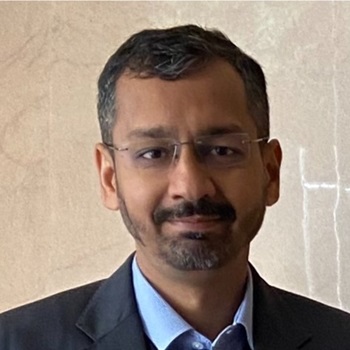.png)
The Warzones Of Today Have No Borders
And the fire we ignore abroad may soon burn through our own certainties.


Dr. Srinath Sridharan is a Corporate Advisor & Independent Director on Corporate Boards. He is the author of ‘Family and Dhanda’.

Kirti Tarang Pande is a psychologist, researcher, and brand strategist specialising in the intersection of mental health, societal resilience, and organisational behaviour.
June 18, 2025 at 7:50 AM IST
There was a time when humans had the courtesy to confine wars to frontiers. When conflict erupted, it erupted elsewhere. You could read about it, shake your head, perhaps even lament it over coffee, but it rarely trespassed into your food prices, your currency, your inbox, or your conscience. That era is over. The Israel-Iran confrontation, a clash between two powers without shared borders, proves this irrevocably. We live in a world where distance no longer insulates; it only delays the reckoning.
The tragedy of our age is not that war persists, but that we have folded its horror into habit. We call this modern life. The globalised system we built to ferry capital and collaboration now carries consequences with chilling efficiency. When missiles stall shipping lanes, sanctions void contracts, or algorithms radicalise minds oceans away, we glimpse the true cost of connectivity. This is no longer about isolated tragedies. It is about systemic collapse—the steady erosion of oceans, cyberspace, and climate frameworks into dark theatres of grey warfare. Sabotaged cables, ransomware, disinformation: these are the embers drifting from distant fires, igniting chaos in our own backyard.
Even in the world of capital and commerce, the impulse to reduce catastrophe into metrics has become second nature. Boardrooms and global investors now treat war as a spreadsheet variable, accounting for supply chain rerouting, factoring in risk premiums, and tolerating cyberattacks as the cost of digital engagement. As if violence, when mediated through analytics and logistics, somehow loses its moral urgency. What was once unthinkable has become priced in. The business of war is now a breakfast topic in Davos, where moral consequence is whitewashed by strategic vocabulary.
How easily boardrooms normalise what battlefields weaponise. Consider the modern corporation: a masterclass in compartmentalisation. Supply chain collapses are ‘quarterly disruptions.’ Cyberattacks merit press releases about ‘resilience frameworks.’ Food inflation becomes ‘pricing adjustments.’ Language sanitises the haemorrhage. When drones strike, CEOs recalibrate profit margins over breakfast. When missiles reroute global shipping, logistics teams file it as a ‘Q2 contingency.’ War is no longer an external shock; it’s a spreadsheet variable, its human cost distilled into earnings calls.
But this isn’t adaptability. It is societal atrophy. The same firms that spend millions future-proofing against climate change often balk at auditing suppliers in conflict zones. They tout ESG pledges while lobbying against sanctions that might dent revenue. The dissonance would be laughable if it weren’t lethal. Corporations increasingly treat geopolitical fires as ‘externalities,’ as if their supply chains float in a moral vacuum. But when 40% of the world’s oil passes through a strait Iran could close tomorrow, ‘external’ is a dangerous fantasy. When Taiwan’s semiconductors—powering your phones, hospitals, satellites, and stock markets—sit in China’s crosshairs, ‘business as usual’ is not resilience. It is complicity.
Not surprisingly, the global private sector’s silence is deafening. Where are the industry consortiums pressuring governments to secure maritime routes? Where is the C-suite outrage over ransomware networks that siphon off trillions while compromising entire economies? When Big Tech monetises, for example the Middle East tension via ad spikes on disinformation platforms, it is not geopolitical neutrality—it is profiteering. But then for all we know, aren’t these all a symbol of political approval as geopolitical weapon? Markets can no longer claim to be apolitical when their algorithms fuel the very chaos they claim to hedge against.
India understands this intimately. The illusion that a rising power with a fragile neighbourhood and thirsty economy could remain detached was always naïve. Now it is suicidal. Every geopolitical tremor, be it in Ukraine’s wheat fields or Iran’s oil fields, ripples through our energy security, food inflation, and social cohesion. Neutrality has lost its protective shield. In a world where supply chains are militarised and cyberspace weaponised, there are no bystanders. Only actors and hostages.
Our challenge is not choosing sides but defining our centre of gravity. Strategic autonomy is not inaction. It is the deliberate exercise of agency in a world sliding toward entropy. India stands at a crossroads: we are a civilisational state with ancient memory and a modern nation with global ambition. We cannot view conflict solely through trade corridors or oil prices. There is a moral dimension to power and strategic danger in silence. We speak of digital sovereignty, economic resilience. But where is our vocabulary for moral sovereignty? The courage to act, speak, and intervene as the world unravels?
Caution tempts us. To wait. To watch. But what we witness is not a passing storm. It is the birth of a fractured age—a multipolar world governed not by balance, but by imbalance. Alliances shift like desert sands. Deterrence wears asymmetric faces. The line between war and peace blurs into permanent grey. This is not a new Cold War. That era had rules, blocs, backchannels. What we enter now is a wilderness where no actor controls escalation and no theatre remains local.
The cost of passivity will be incremental. A percentage point of inflation here. A refugee wave there. A cyber breach quietly draining national resolve. Over time, we become reactive, chronically late, strategically unmoored. Soft diplomacy without teeth or timing is mere commentary. India must now act as an anchor power—not just a balancing one. We must invest in capability, yes, but also in clarity. In foresight, but also in fortitude. For the peacekeepers of this century will not be those with the largest arsenals, but those who can hold stability when everything fractures.
This is the quiet horror of our times. Nations outsource wars to mercenaries for plausible deniability. They cloak interventions in the language of global concern while extracting sovereignty, silence, and submission. We perfect violence, abstract accountability, and still call it civilisation. But when fire spreads across borders—through oil markets, data streams, or displaced souls—it does not discriminate. It is no longer on someone else’s soil.
It is in our lungs.



